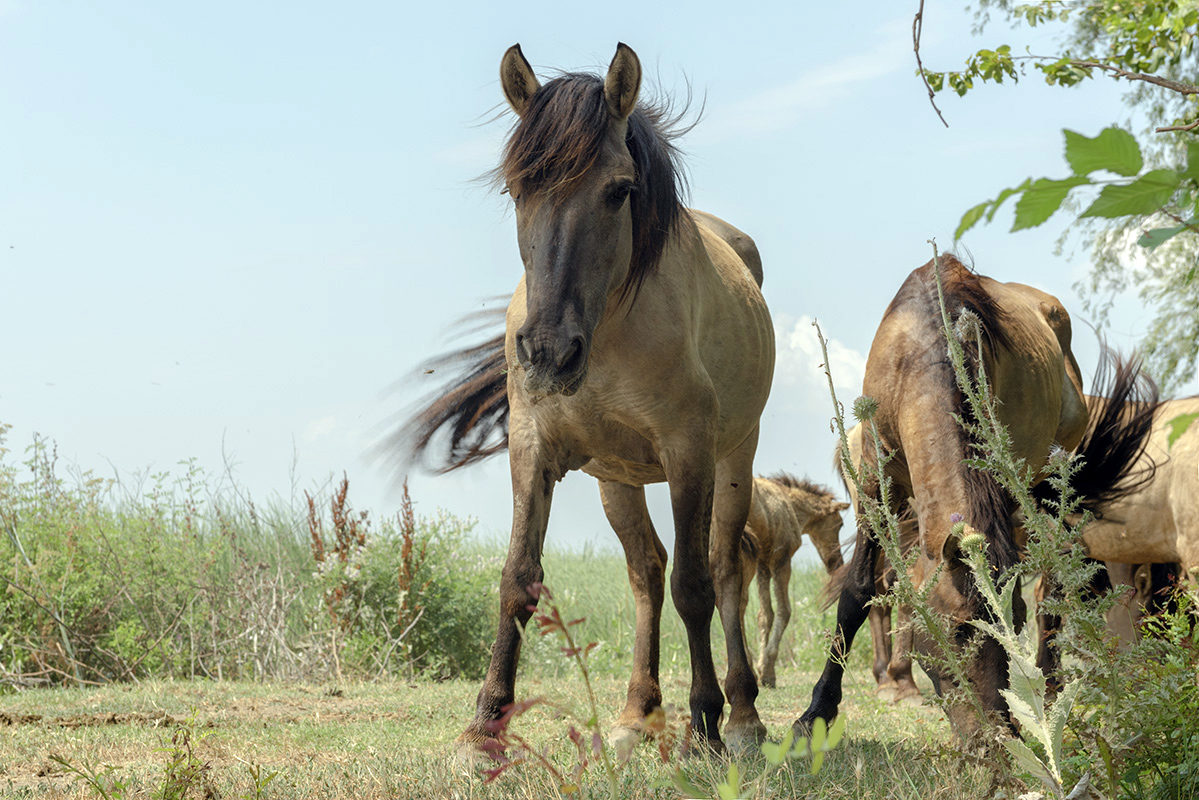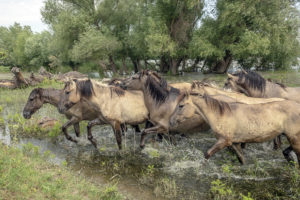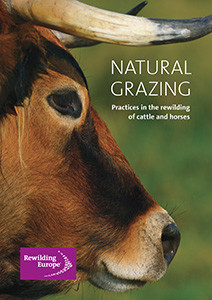The herd of Konik horses shipped to the Danube Delta from Latvia earlier this year is now roaming free. Following a quarantine period the 23-strong group of animals has just been released on Ermakov Island, in the Ukrainian part of the Danube Delta rewilding area. As the first ever shipment of Koniks into the delta, these hardy herbivores will diversify habitats and enhance local wild nature.

Final destination
Two families of Konik horses are now roaming Ermakov Island in the Ukrainian part of the Danube Delta rewilding area. Having made the short journey from the nearby village of Orlovka, the 23 animals were released on June 25.
The release on Ermakov Island was the last step in a long journey for the Koniks. The animals travelled around 1800 kilometres from Latvia to Orlovka at the end of March – the first time that Konik horses had been translocated into the delta.
Since then the herd has already grown in size, with four foals born on Ukrainian soil. After their arrival in Orlovka the animals were kept in quarantine for nearly 3 months until their relocation to Ermakov.
Diversify natural dynamics

Interacting with natural processes on Ermakov Island, the completely free-living Koniks will greatly diversify natural dynamics and habitats through behaviour such as browsing, grazing and fertilising, thereby benefitting a wide range of animals and plants.
“These large herbivores will play a very important role in the Ermakov ecosystem,” says Rewilding Ukraine team leader Mykhailo Nesterenko. “Like the extinct wild Eurasian horse known was the Tarpan, from which they are descended, they are robust and well adapted to living in wild conditions. They can survive harsh winters and defend themselves against predators.”
Herbivores in partnership
The shipment of Koniks to Ermakov is the second herbivore release on the island in recent times. At the end of May, a herd of eight water buffalo was brought to the island by Rewilding Ukraine. These animals are already well acclimatised and having a beneficial impact on their new environment. In the next few weeks another 10 water buffalo are scheduled to arrive in Ermakov from the Ukrainian region of Transcarpathia.
Together with other natural processes such as storms, forest fires and flooding, guilds of large herbivores have the potential to reshape landscapes across Europe. But for this to happen, their numbers need to be sufficiently high enough and the species composition sufficiently diverse. Occupying different ecological niches, different herbivore species not only compete, but also facilitate each other.
“Unlike bovines (such as cattle and buffalo), which are typical grazers, Konik horses also browse vegetation,” explains Nesterenko. “This means the combined impact of wild bovines and equines (horses) on the Ermakov landscape will be far greater than the impact of just one of these herbivorous species.”
Part of the process

This is the first time that Rewilding Europe has overseen a translocation of Konik horses into the Danube Delta.
The animals were brought to the Danube region by Rewilding Europe’s partner organisation Rewilding Ukraine, under the framework of the project “Restoring wetlands and steppes of the Danube Delta”.
Funded by a 2.1 million euro grant from the Endangered Landscapes Programme, this is the delta’s largest transboundary restoration project to date. It involves the recovery of natural landscapes, their ecological processes (such as flooding and natural grazing) and associated flora and fauna across at least 40,000 hectares (400 square kilometres) of the Danube Delta Biosphere Reserve in Romania, Moldova and Ukraine.
Natural grazing

Rewilding Europe, which published a booklet on natural grazing in 2015, wants to reverse the decline of biodiversity by returning Europe’s native herbivores – such as wild horses, as well as bovines, chamois, deer and ibex – in significant and naturally balanced numbers to the lands where they once belonged.
In addition to the Danube Delta, Rewilding Europe is currently reintroducing wild horses in three other operational areas: the Rhodope Mountains of Bulgaria, the Velebit Mountains of Croatia, and Western Iberia.
Nature-based tourism destination
In addition to regulating vegetation and landscapes, Ermakov Island’s Konik horses and buffaloes will draw growing numbers of tourists. In partnership with local authorities such as the Danube Delta Biosphere Reserve, the World Wide Fund for Nature (WWF) reflooded the island about 10 years ago by opening up some surrounding dykes. Today it has already become one of the richest areas in the reserve in terms of its wild nature.
This year Rewilding Ukraine will start to help the surrounding communities with tourism infrastructure development and marketing, with the goal of making Ermakov an attractive and well-known nature-based tourism destination.
Related rewilding activities
- Rewilding horses in Europe: from domestic breed to wild herds
- Rewilding Europe’s involvement with natural grazing
- Rewilding Europe’s efforts in the Danube Delta
- Visit the Rewilding Ukraine Facebook page
- Visit the Rewilding Danube Delta Facebook page
- Learn more about the Endangered Landscapes Programme
